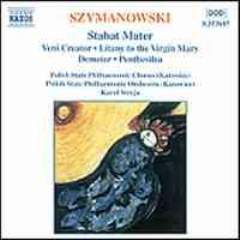Szymanowski - Stabat Mater * Litany to the Virgin Mary * Demeter * Penthesilea (1989)
Szymanowski - Stabat Mater * Litany to the Virgin Mary * Demeter * Penthesilea (1989)

Stabat Mater, Op. 53
1. Stabat mater dolorosa / Stala matka bolejaca: Andante maestoso 07:49 play
2. Quis est homo qui non fleret / I ktoz widzac tak cierpiaca: Moderato 03:05
3. Eia Mater, fons amoris / O Matka, zrodlo wszechmilosci: Lento dolcissimo 04:54
4. Fac me tecum pie flere / Spraw, niech placze z Toba razem: Moderato 03:49
5. Virgo virginum praeclara / Panno slodka, racz mozolem: Allegro 03:16
6. Christe, cum sit hinc exire / Chrystus niech mi bedzie grodem: Andante tranquillissimo 5:18
7. Veni Creator, Op. 57 10:40
8. Litania do Marii Panny (Litany to the Virgin Mary), Op. 59 09:02
9. Demeter, Op. 37b 07:35
10. Penthesilea, Op. 18 play
Jadwiga Gadulanka, soprano
Andrzej Hiolski, baritone
Krystyna Szostek-Radkowa, contralto
Barbara Zogorzanka (soprano),
Anna Malewicz Madej (alto),
Roma Owsinska (soprano )
Jan Wojtacha, choirmaster
Polish State Philharmonic Chorus Katowice
Polish State Philharmonic Orchestra, Katowice
Karol Stryja, Conductor
Rok nagrania : 1989
Beauty. Szymanowski's music went through several changes, beginning in a Straussian chromatic fog and ending up in searing clarity. This program covers many of those phases.
Penthesilea, from 1908, belongs to a fin de siècle genre -- a Hellenism which, despite its borrowings and scenery, had little to do with classical Greece. If you read writers like Wilde, Louys, and d'Annunzio, you get the impression that all people did in mythological Greece was indiscriminate humping ("with either sex at either end") mixed with S & M and bizarre slaughter. Hofmannsthal probably produced the lasting work in this vein. Over almost all of it, however, hangs a steamy atmosphere like a cloying, heavy perfume. Musically, Granville Bantock seems to me the composing poster-boy for such stuff, although Debussy's Le martyre de St. Sébastien and Strauss's Elektra probably rank as the major musical masterpieces. This sort of exoticism attracted Szymanowski for far too long, even when the locale changed from Greece to Persia, as in his Third Symphony. Penthesilea, a dramatic scena for soprano and orchestra, falls short of all these marks, but it's not terrible. In it, the queen of the Amazons confesses her love (forbidden, of course) for Achilles. Its lack of direction is its main problem. It's not particularly dramatic or revelatory of character.
Demeter (1917-24) is a different story. Szymanowski sets a sonnet by his sister Zofia on the legend of Demeter and Persephone. A distraught Demeter searches through the night for her daughter, abducted by Hades. The hothouse pong has lifted a bit, and although we still get a lush (and dramatically inapt) orchestra, Demeter's anxiety comes through.
Szymanowski was always a fine composer, but in the Twenties he became an interesting, even great one. From 1911 to 1914, he left Warsaw and its provincial, conservative music scene for Vienna and Paris. It took him a while to absorb the new Modern influences, but he eventually succeeded. Stravinsky affected him, not so much in direct idiom, but by his example of using folk sources to create something personal, rather than derivative, no matter how polished. Stravinsky seemed to allow Szymanowski to reconcile his taste for the exotic with his nationalist goals. It often happens that few turn out more exotic than one's family.
Poland for a very long time was less a nation than a culture, held together by language, art, and Catholicism. The remaining three works, despite their liturgical titles, are all original Polish poems -- the Stabat Mater and Veni Creator free paraphrases of the Latin prayers. In 1918, Poland became a formally-independent country, and this sparked even greater nationalist feeling among its writers, musicians, and artists. Szymanowski wrote his Veni Creator (1930) for the establishment of the Warsaw Academy of Music, which he headed for two years. Taking his text from a poem by Stanislaw Wypiánski (who also wrote the text of Penthesilea), Szymanowski creates something official and gorgeous at the same time. It reminds me a bit of Elgar's occasional pieces or a royal wedding procession. Duty may hang over it, but it's still stunning.
Zmieniony (Sobota, 23 Marzec 2013 21:26)








